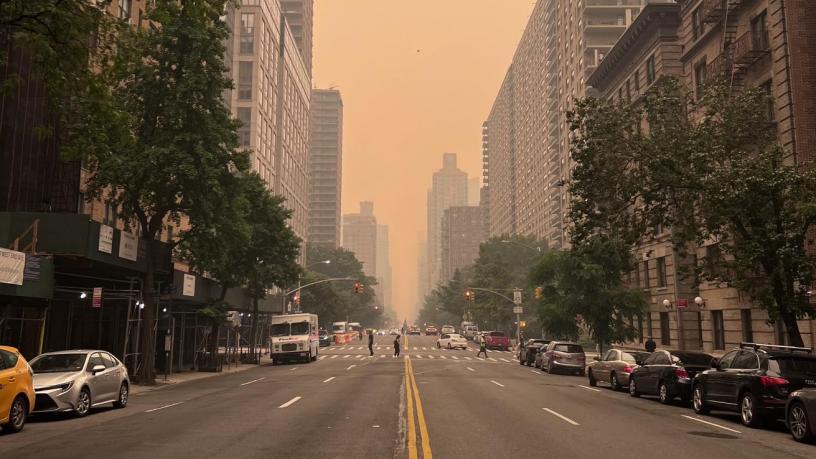An Expert in Air Pollution Weighs in on New York City’s Air Quality Emergency
Atmospheric chemist Faye McNeill explains what’s going on, how long it will last, and what you can do to stay safe.

Credit: Angela Meadows
As a giant cloud of wildfire smoke settled into the city this week, even healthy New Yorkers experienced sore throats, watering eyes, and headaches. The air contained more of the smallest, most dangerous particles (2.5 microns in diameter and smaller) on Tuesday and Wednesday than it had since daily measurements began in 1999. At one point, New York had the worst air quality of any major city in the world.
V. Faye McNeill, professor of chemical engineering and earth and environmental sciences, is an atmospheric chemist, an expert in air quality, and the PI and co-lead of the Clean Air Toolbox for Cities. We sat down with McNeill for a short conversation about New York City’s air quality emergency.
This interview has been edited for length and clarity.
How long is this situation going to last?
This current air quality emergency may last another few days. The smoky air is being caused by wildfires in Quebec that are not yet under control. Shifting wind patterns may bring some relief by Friday as the smoke blows more to the Midwest.
How bad has air quality been during this emergency? Is this a “new normal”?
The Hazardous category that was reached late in the day on Tuesday and Wednesday was about as bad as it gets. As the climate is changing, we can expect extreme fires that can influence air quality far away to happen more frequently. However, we usually don't see more than one of these episodes in a year in New York City.
How should we keep ourselves safe during this emergency?
It is recommended that everyone minimize outdoor activity as much as possible, especially sensitive groups such as those with heart or lung conditions, children, and the elderly.
Some people think it is better to turn the air conditioning off since the AC may bring in outdoor air. It's actually better to keep the AC on, especially if you're having breathing difficulty and you need it to keep a comfortable temperature.
What extra precautions can people with asthma take?
My children have asthma, so I am running the air purifiers in their bedrooms. If you have asthma that's triggered by air pollution or another heart or breathing condition, wearing a filtering mask (KN95, N95, KF94) outdoors may also help.
If you don't know whether or not your asthma is triggered by pollution, because we're lucky enough that we haven't experienced this many times lately in New York City, carry your rescue inhaler with you.
Keep up with McNeill on Twitter and through her lab’s blog, AIRE: Air pollution and Aerosol Information Resource for Educators and students.
